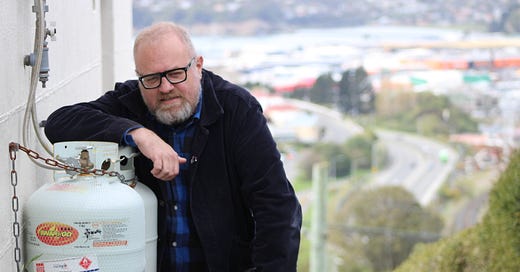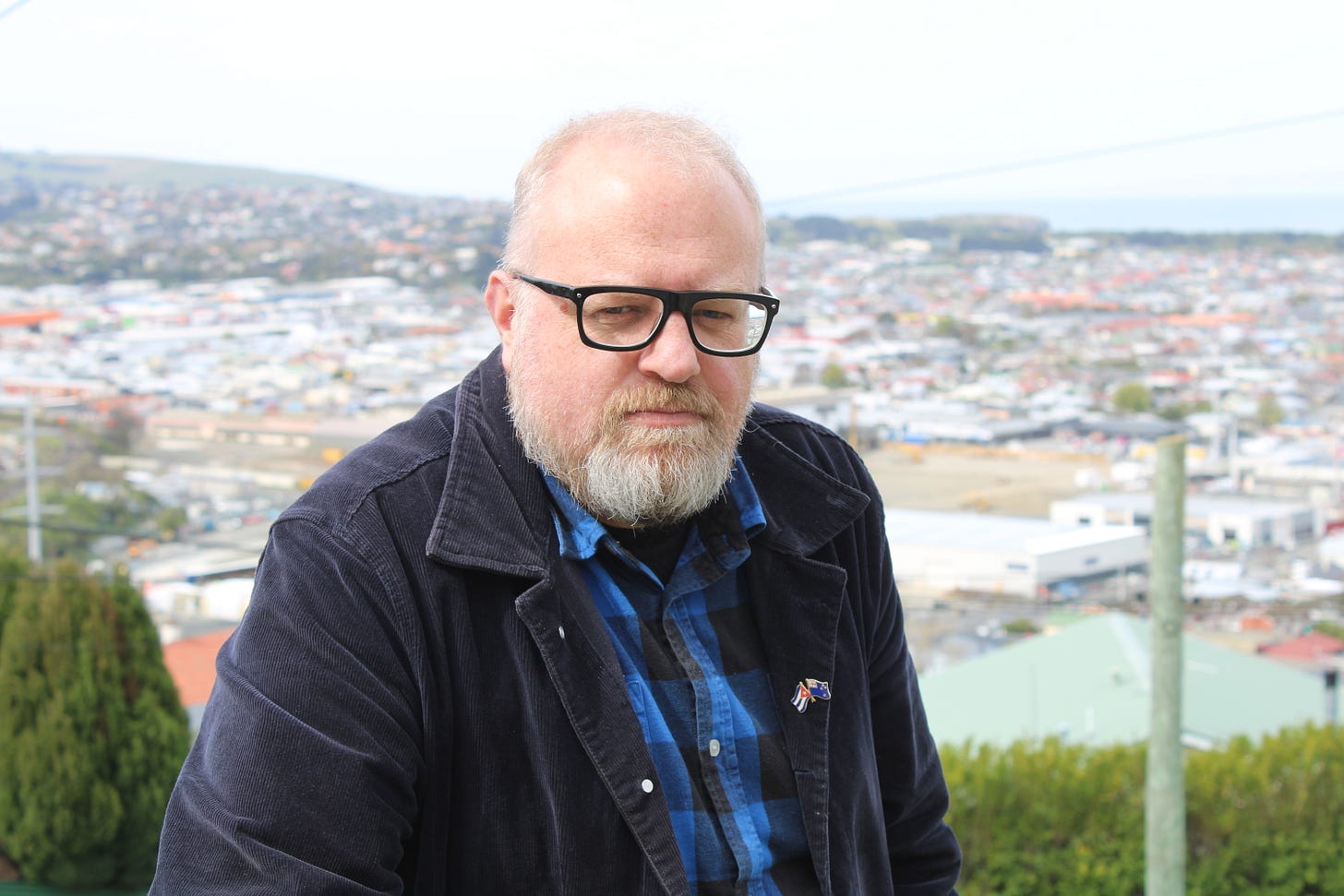Sometimes nothing is as infuriating as dealing with customer services. Trying to recall long forgotten security questions, dealing with a patchy line as the person from another country tries to decipher your Kiwi accent.
Gah!
I have absolute sympathy for Victor Billot, who has gone above and beyond in trying to get a straight answer out of Genesis.
Instead, the provider has walked away from supplying him with gas.
Billot moved into his new home in the Dunedin suburb of Clyde Hill at Christmas, arranging in advance for Genesis to supply electricity and gas for hot water and the cooking hob.
So far, so good.
When he moved in he discovered the 27kg gas bottles at the side of the home had disappeared, leaving him without hot water or cooking facilities. Attempts to get an answer from Genesis proved difficult.
“They messed me around for days.”
The company eventually cited health and safety issues as the reason for no longer supplying 27kg bottles to Billot’s property, which has steep access (although I have seen much worse in Dunedin).
“It is a bit difficult, I’m not saying it isn’t . . . but it is not exactly a cliff.”
The company would also not deliver 45kg bottles to the address, leaving Billot left with no option but to fill two 9kg cylinders, which he did every other week.
That meant the single father was likely to face an expensive bill to convert the gas hot water back to electricity.
Billot was annoyed that the company did not inform him that they were no longer delivering 27kg bottles when he signed up as a new customer.
That was despite delivering the 27kg bottles to the previous occupant, which the company said was a “legacy customer”.
“Obviously if you are a legacy customer they keep on delivering it, but because I’m new they said ‘no’.”
It comes as no other companies were delivering 27kg gas bottles to Dunedin households – businesses could still have that size, but other New Zealand centres, including Christchurch Hamilton, Tauranga and Auckland, still had that size of gas delivery.
An email to Billot from a Genesis resolutions coordinator from the company said: “We acknowledge the poor experience and conflicting information was provided and wish to assure you feedback has been passed onto the staff concerned via their managers”.
Billot was initially offered $100 credit by the company “to basically go away”.
He declined and took his case to the Utilities Disputes, an independent dispute resolution service for electricity, gas, and water complaints.
Billot said he wanted to clarify whether a utility had any wider responsibilities to ensure supply.
“I don’t want to do this, I want them to do it because that is their job, and they were doing it until I moved in.”
He was concerned about the impact it may have on other Dunedin residents, such as the elderly, who lived in steep sections and who may have no delivery options available.
That decision by commissioner Mary Ollivier noted that his property was up some steps and a vertical path, making it unsafe to transport LPG bottles by trolley. It also noted that while there was a driveway close by, Genesis was not able to access it, meanwhile the front of the property could be slippery when wet.
Billot accepted some of those reasons were reasonable for the supply of 45kg LPG bottles, but not for the 27kg bottles he requested.
As Genesis had reneged on the agreement to supply his property with gas, Billot argued that they should compensate him for the changes required for his hot water and heating systems.
The decision noted the company had accepted it had supplied incorrect information about its ability to supply LPG.
“It would have been preferable if Genesis had confirmed the restrictions in place re delivery of LPG bottles before transferring Mr Billot’s account to the new property,” the decision noted.
It also acknowledged Billot’s frustration over the poor customer service, with the company offering him $250 customer service credit over the “conflicting information it provided”.
The offer of the $250 was “a fair and reasonable offer” to resolve the communication issues.
The company’s decision to stop delivering 27kg bottles, was a commercial decision “it is entitled to make”.
“It is also based on its initial safety assessment. I am unable to direct Genesis to change its practice in this area and cannot take this aspect of his complaint any further.”
“I am satisfied Genesis has not acted unreasonably and has made a reasonable offer to resolve the complaint.”
The decision noted that Billot could take the matter to the Disputes Tribunal or the District Court, but he was unlikely to take it further.
I got a reply from Genesis about the matter, and they confirmed “Genesis has moved away from supplying residential deliveries of LPG bottles under 45kg nationwide”.
And that isn’t all.
Asked if you would still be supplied gas if you bought a home on a steep section, the spokesperson confirmed trained drivers would check each property on a “case by case” basis.
“While we make every effort to serve customers on the variety of sites found among New Zealand homes, we may delay, suspend, or end our delivery at any time if access to a customer’s property and/or the cylinder installation point is considered to present an unacceptable risk to health and safety.”
That could be due to steps, a steep slope, uneven ground, or distance from truck parking to the cylinder installation point, the spokesperson said.
If gas could not be delivered to a property safely, then the company would “do our best to work with a customer to identify any alternative solutions that could address safety concerns”.
“However, it is the customer or home owner’s accountability to put the improvements in place.”
“Genesis is sorry if changing standards over time may leave a customer facing hard choices or costs and we do not take this lightly, however, we are facing too many unsafe properties and we are obliged and take seriously our accountabilities in regards to safety.”
Meanwhile, Billot urged new homeowners to seek assurances about their gas supply before moving in.
“It seems it is acceptable for a major utility to break an agreement to supply and then compound it with incorrect advice – with little effective consequence.”
Thanks for sharing Victor.
Here is a cool project from Otago Polytechnic, which has helped provide a solution to recycling milk bottle tops.
The milk bottle top shredder (surely it needs a better name!) was designed and built by Otago Polytechnic electrical engineering students, and was donated to Connections Education Development Trust, which provides training and employment opportunities in Dunedin for people with high-support needs.
The machine will be installed this week.
I never knew that milk bottle tops couldn’t be put in recycling bins because of processing difficulties.
But this machine will prevent them from going to landfill, by shredding them and then they can be sold in bulk to be converted into new products.
Nice work Otago Polytechnic and Connections!
Here is Tweet of the Week:
I also note there are just two more chances to get some kai from the Dunedin Bowling Club, before they move from their South Dunedin-based food truck site to a permanent store in Caversham.
This Kiwi album was released last week, it is outstanding.
I’ll finish with this, the time a former Dunedin resident (yes, I went there) later tested for a part as Bond. James Bond.

Have a great week!











Lee is referring to a paper by Scherer & Sam "Big Stadium, Small City: A Catalyst for Turbulence
and Governance Reforms" on his webpage.
At some stage this stadium will need to be mothballed, or more to the point the relevant companies liquidated, due to the yearly costs which far exceed the profits from Forests which is more or less the only Dunedin City company bringing money in (or was I havn't checked for the last few years). Consequently at some stage they won't be able to borrow anymore to cover the shortfalls at the Stadium (and interest rates are going up for those loans too).
Do we need to wait until then?
But don't let me disturb you Hamish. Gas bottles are important.
He can still use 9kg bottles right?